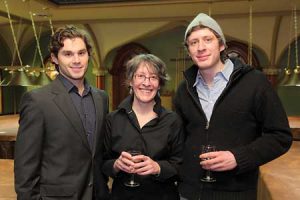
By Chris Chipello
McGill has quietly launched a mentoring program for undergraduates that could grow into an important element in the University’s efforts to be ever more “student-centred.”
The new Staff-Student Mentoring Program pairs students with academic or non-academic staff members who volunteer as mentors. Since it got off the ground in February the program has brought together about 55 students with staff members or professors from outside the students’ disciplines for informal conversations about topics ranging from the first-year experience to shared hobbies and interests.
For incoming undergrads, the idea is to help them get acclimated and integrated into the University community more quickly, explained Dean of Students Jane Everett, whose office is operating the program initially as a small-scale, pilot project. For students already here, it can help them connect with areas of the University with which they’re unfamiliar.
The initiative fits into a key
priority for McGill: Enhancing advising and mentoring was one of the goals laid out by the Principal’s Task Force on Student Life and Learning in its 2006 final report.
While many universities have mentoring programs, McGill’s emphasis on staff involvement represents a unique twist – as does the practice of pairing students with mentors from outside their discipline.
A big idea
The idea was cooked up by Chemistry Prof. David Harpp, who saw a need to complement traditional academic advising and other services such as the alumni mentor program. Harpp had fielded numerous requests from students in his lecture classes for letters of recommendation to grad schools or potential employers. “I wouldn’t know them, necessarily, but took their point that they’d had nothing but large classes, and they just hadn’t gotten to know any (professors).”
It struck Harpp that undergrads would benefit from having “somebody who could have their backs and support them.” The mentor would be “sort of their aunt or uncle away from home, is how I looked at,”
Harpp also figured it would “add to the fabric of the University” if students could connect with professors from different disciplines – or with experienced staff members who help run the university in areas such as legal affairs, building services, information technology, finance and communications.
For non-academic staff members, many of whom have little day-to-day contact with students, mentoring would provide a chance to make that connection. Harpp’s preliminary soundings indicated many would jump at the opportunity. At the end of a lecture to about 250 managers on a separate topic, Harpp described his idea for a mentoring program and asked if members of the audience would be “absolutely yes,” maybe, or not interested in participating. Responding with clickers, a resounding 80 per cent said “yes” and another 10 per cent “maybe” – prompting a spontaneous round of applause.
Harpp enlisted three students – now graduated – who worked with Everett and a fourth student to figure out how to structure the program. “Students are excited” about the new program, said Amara Possian, who became the lead student organizer after the original four graduated.
For some mentees, the program represents a rare opportunity for face time with professors. Ana-Maria Iancu, a third-year Physiology major, said her courses are all lecture-style classes with around 200 students. Since faculty members often focus on research and their work with graduate students, “undergraduates are typically at the bottom of the food chain.”
Getting the program set up required extensive preparations. Everett’s office worked with information-systems staff to develop a new system for collecting volunteers’ information and matching them up.
Go-to person for feedback
Some of the first mentors are staff who learned about the program as it was being set up. Mark Ordonselli of Communications Services, for example, now mentors two students. One is Jessica Xiao, a first-year student majoring in Economics and Psychology, who said she was drawn to the program because at her small high school in New Jersey she had appreciated having a teacher as a “go-to person for advice … someone to share struggles and concerns with, to get some feedback and learn from their experiences.”
In her first meeting with Ordonselli, Xiao mentioned she was curious about graphic design. He quickly put her in touch with one of McGill’s graphic designers, “which was awesome,” Xiao said.
Everett herself meets every two or three weeks with each of her two mentees. Andrew Lacenere, an Economics and Philosophy major, is writing a work of fiction. His conversations so far with Everett have tended to revolve around writing – naturally enough, since Everett’s academic background is in literature and literary translation. “I’m going to get a business job probably,” he said, “but I wouldn’t mind becoming a writer someday.”
For now, the small-scale, pilot launch gives Everett’s office a chance to gauge how many people may want to sign up. It also gives her office time to create a template for academic units that might want to set up their own program.
The Student-Staff Mentoring Program is “one component for enhancing a culture of mentoring at McGill,” Everett said. “We’ll assess over the next few months where we’ll go” in expanding it.
On the web: www.mcgill.ca/mentoring
